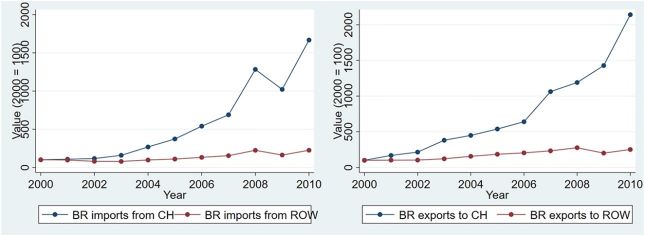We use cookies on this site to enhance your experience.
By selecting “Accept” and continuing to use this website, you consent to the use of cookies.

Research by Ridwan Karim, assistant professor in the Department of Economics, is helping to shed light on the wide variety of mechanisms through which trade shocks affect public health outcomes, sometimes with surprising consequences.
His recent publication, “Trade Boomers: Evidence from the Commodities-for-Manufactures Boom in Brazil," uses data in the sphere of infant births in Brazil to explore how birth outcomes were shaped by exposure to 2000-2010 Brazil-China import and export growth.
Brazil provides a compelling context to study this question. China’s growing prominence as a trade superpower placed competitive pressure on Brazilian manufacturing, mirroring the experiences of many advanced industrialized nations. However, unlike the experiences of these countries, Brazil also benefited from increased export demand in resource-based goods China needed – a phenomenon known as the manufactures-for-commodities boom. The charts below depict both trends following China’s accession to the World Trade Organization (CH denotes China and ROW denotes the rest of the world). Brazil is large and diverse enough (in terms of its initial comparative advantage across regions) that the effects of these two separate shocks can be disentangled.

Figure showing both Brazilian exports to and imports from China underwent rapid growth relative to Brazil’s trade with the rest of the world in the 2000s.
The research finds that higher export growth led to higher average birth weights for babies and lower infant mortality rates, driven by increases in real incomes in the benefitting regions. However, upending the predicted expectations of the research, higher import growth from China - a negative shock on real incomes – also led to bigger babies and lower infant mortality rates. How could this have happened?
Could lower pollution from fewer active factories explain these improvements in infant birth outcomes? Did the import shock trigger increases in social assistance programs and public health goods? Or maybe the shock changed household composition in affected regions? As it turns out, the evidence for most of these channels is either weak or non-existent. Instead, the evidence points towards a huge reduction in fertility rates across all age groups for women as a response to the negative import shock. This suggests that selectivity in births induced by negative income shocks, combined with concentration of household resources on the children that are born led to better infant health outcomes. This research highlights the many ways in which trade shocks operate in developing countries, often with surprising results.
Reference: Karim, Ridwan. "Trade Boomers: Evidence from the Commodities-for-Manufactures Boom in Brazil" Journal of Globalization and Development, vol. 14, no. 2, 2023, pp. 413-446. https://doi.org/10.1515/jgd-2023-0013